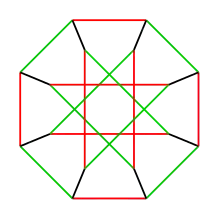Pauli group
In physics and mathematics, the Pauli group on 1 qubit is the 16-element matrix group consisting of the 2 × 2 identity matrix and all of the Pauli matrices
- ,

together with the products of these matrices with the factors and :
- .
The Pauli group is generated by the Pauli matrices, and like them it is named after Wolfgang Pauli.
The Pauli group on qubits, , is the group generated by the operators described above applied to each of qubits in the tensor product Hilbert space .
As an abstract group, is the central product of a cyclic group of order 4 and the dihedral group of order 8.[1]
The Pauli group is a representation of the gamma group in three-dimensional Euclidean space. It is not isomorphic to the gamma group; it is less free, in that it's chiral element is whereas there is no such relationship for the gamma group.
References
- Nielsen, Michael A.; Chuang, Isaac L. (2000). Quantum Computation and Quantum Information. Cambridge; New York: Cambridge University Press. ISBN 978-0-521-63235-5. OCLC 43641333.
